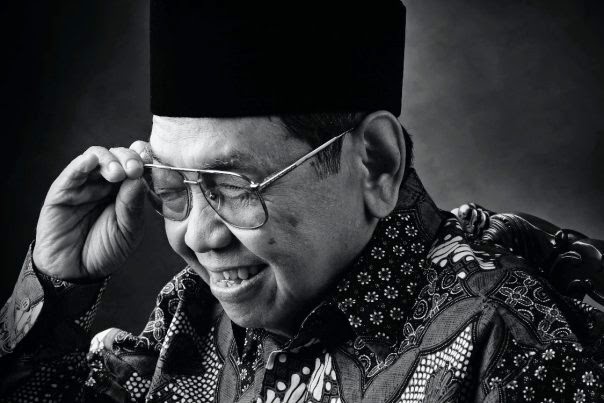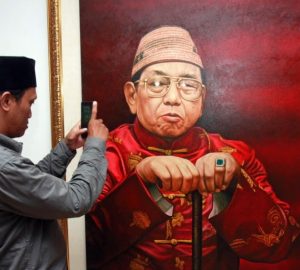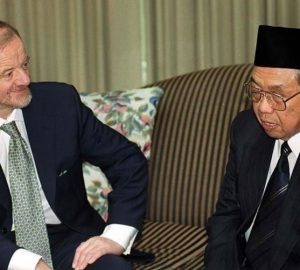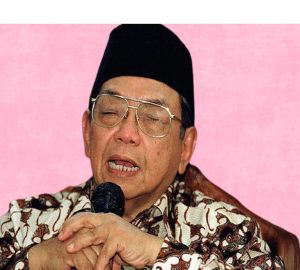In Humanisme Gus Dur book, Syaiful Arif as the writer gave explanation about Gus Dur’s statement by saying that when Islam does not become a state, it does not lose its significance. This is because Islam still acts as a social ethic in the context of nationality. Indeed, this is not formal, but Islam as a cultural foundation in national life can play a more optimal role because it is rooted in the people’s life, thus Islam is not just just something on a paper.
Prophet Muhammad PBUH never declared an Islamic state. The agreement with Christians and Jews resulted in the charter of Medina which established the state of dar al-Salam, a peaceful state. The agreement, for it is signed on a paper is still easily violated. This is almost the same as what happened during Henri IV in France. However, the context is different, it was concerning the feud between Protestants as minorities and Catholics as the majority. Therefore, strengthening the social base, as Gus Dur stated with his social ethics, is very important to do so that it is not only a vivendi mode as stated by Richard H. Dees quoted by Zuhairi Misrawi in his book, Pandangan Muslim Moderat.
Actually, all pillars of Islam contain social elements. Syaiful Arif outlined an example of Gus Dur’s statement about expanding the meaning of worship in the pillars of Islam socially, such as the declaration of the shahada that must be witnessed by several other Muslims. Prayers are better carried out in congregation. Zakat is given to the poor. Fasting as a media to feel social concern. Also the Hajj as an opportunity to meet other Muslim communities worldwide.
Seeing this, Islam teaches us to socialize and not limit it. The Prophet Muhammad himself even fed up a blind Jews who continued to berate him. Until when Abu Bakr R.A., who replaced the Prophet fed him, the person felt awkward because the food did not taste the same, it was not as soft as the one who usually fed him. Then Sayyidina Abu Bakr said that the one this blind man meant was the one he mock the most, namely Prophet Muhammad. Abu Bakr, the first Caliph, replaced the prophet because he had died. At that time, the blind man then converted to Islam.
We also know the history of how lafadz in takbir changed became sami’allah liman hamidah because Sayyidina Ali was reluctant to overtake an old Jewish man on the way to mosque. It is said, when the Prophet Muhammad performing ruku’, he was detained by an angel so as not to i’tidal first, even the sun was detained so as not to rise first so that the Fajr time was not used up until Sayyidina Ali could join the ruku’ of the Prophet so as not to lose the jama’ah.
These two stories have shown that we must respect people of different faiths, tribes, or nations. Allah SWT already confirmed in the Qur’an surah al-Hujurat verse 13 that humans were created nations and tribes to know each other. This mutual meaning must be emphasized because not only one party knows the other, but two or many parties know each other.
Ulema categorize brotherly relations as a link that must be held tightly by us, namely ukhuwah Islamiyah, ukhuwah wataniyah, and ukhuwah insaniyah. Brotherhood of fellow Muslims is tied to the fabric of the Islamic religion, ukhuwah Islamiyah. Different religions but still one nation, Indonesia for example, there is still a network of compatriots. We have different nations and religions, at least we are still fellow humans who still have to respect each other, ukhuwah insaniyah.
Allah, as the creator, respected and honored the son of Adam, wa laqod karramna bani Adam. In the Qur’an surah al-Isra verse 70, Allah uses two reinforcements, namely with lam taukid and qod. This is because of the glory of God to the people. The verse can be interpreted as “We truly glorify Adam’s descendants.” This glorification of God towards humans can be seen from the physical as the most perfect creature.
More clearly, Imam Ibn Kathir explained that humans walk on two legs, eat with two hands. While animals eat directly using their mouths. He also wrote in his commentary, Tafsir al-Qur’an al-Adzim, that humans are given vision, hearing, and heart as a medium to be able to distinguish good and bad things. This is confirmed by another verse, in Surat al-Tin the fourth verse, laqad khalaqna al-insana fi ahsani taqwim, “Verily, We created man of the best stature (mould).”
Thus, fellow human beings are equally noble. Allah never discriminates us according to faction, religion, or tribal race. They all still get his favor. Only one thing distinguishes all human beings, namely the quality of their piety.
Therefore, people today must not only improve their quality as individuals who serve God, but also as social beings, we must maintain relationships with anyone, including people of different religions, tribes, or nations. For whatever reason, insulting or even killing other people under the pretext of religion cannot be justified. Don’t we know the saying o “a thousand friends is still too little, while one enemy is too much” ?
Artikel ini juga tersedia dalam bahasa Indonesian![]()





